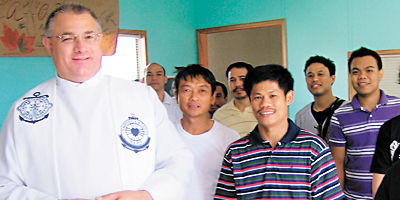
 MOUNT PLEASANT—For eight months straight, Christopher B. Ga-as lives and works on an ocean-going container ship carrying goods from port to port around the world.
MOUNT PLEASANT—For eight months straight, Christopher B. Ga-as lives and works on an ocean-going container ship carrying goods from port to port around the world.
He is gone from his island home in the Philippines for about 240 days, missing his wife and 8-year-old son, his friends, extended family, and church.
Ga-as and other men who work on the huge ships say it is a lonely life.
This is where the Seafarers ministry comes into action.
Donning white hard hats emblazoned with blue crosses, the men and women volunteers are welcomed aboard the ships like old friends.
They bring rosaries, religious and secular reading material, phone cards and more.
Gene McLaughlin, a parishioner at St. Benedict Church, is one of the regulars with the Charleston Port and Seafarers’ Society at the Wando-Welch terminal in Mount Pleasant.
He shouts out a friendly welcome from the docks and is waved on board by the crewman on duty. McLaughlin said he always greets the captain or officer in the control room to find out what the crew needs.
Popular items include cards to call their families, and those who are off duty are usually anxious for a ride into town, where volunteers take them to various stores.
Recently, the Seafarers’ Society held a grand opening and blessing of their new center, located right across the road from the docked ships.
The highlights of the center are the phones and free Internet access via six computers.
On the day of the blessing, men from a multitude of countries used the center to e-mail with their families, share photos, and even see each other through Skype.
Father Robert F. Higgins, the diocesan representative with Apostleship of the Sea, gave the convocation and volunteers read the psalm in a dozen different languages.
Episcopal Bishop Alex Dickson blessed the center as other dignitaries cheered, including Msgr. Chester M. Moczydlowski and Franciscan Sisters Kathy Adamski and Pat Rogan.
Father Higgins, who is also pastor of St. Anthony Mission in Hardeeville, drives to the port at least once a month to celebrate Mass, offer the sacrament of reconciliation and socialize with the crews.
“It’s not an easy ministry,” he said, describing it as physically taxing, blue-collar, in-the-trenches work. The metal loading stairs are steep, spotted with grease and rock slightly as people climb.
But he said the gratitude of the men — and occasionally women — make it very worthwhile.
“It’s amazing to see these big burly men break down and cry because they haven’t received Mass for so long and are so grateful,” Father Higgins said. “It’s a very, very rewarding ministry. I love doing it.”
It’s an even harder life for the people on the ships.
Ga-as, second officer on one of the vessels, said seafarers can choose different schedules, but their time at home is determined by how long they spend onboard. He said he could work five months on the ship, but then would have less than three with his family. Being in a port that allows free access to the Internet and phones is a blessing, he said.
“We’re thrilled to death with this new facility,” said Fred Sales, another volunteer with Seafarers’ ministry. “We feel like we’ve died and gone to heaven.”
Father Len Williams is the Episcopal chaplain of the Charleston Port and Seafarers’ Society. He noted that the seafarer’s job is extremely important because it impacts the global economy.
“This is a ministry to the world,” he said. “We have to play some small role in taking care of these guys.
“I’m particularly grateful that the Catholic Church has chosen to be part of the ministry because so many seafarers are Catholic,” Father Williams said.
Volunteers, priests and pastors all say that while the ships’ material goods are important, the humans onboard are the truly precious cargo.
